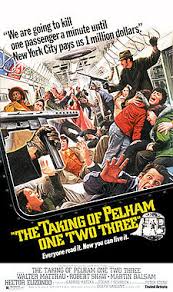
THE TAKING OF PELHAM 123
US, 1974, 104 minutes, Colour.
Walter Matthau, Robert Shaw, Martin Balsam, Tony Roberts, Hector Elizondo.
Directed by Joseph Sargent.
The Taking of Pelham 123 is recommended action excitement. After planes, ships and skyscrapers, the subway train. Too close to daily travelling to make us detached observers of a hijacking, the train contains ordinary people as hostages and, while one can't imagine it happening anywhere but in New York, it has the flavour of realism. Blending comedy dialogue with split-second timing (cinema time corresponding to plot time) and a narrative that continually gathers momentum like the speeding runaway train, this film succeeds in what it set out to do, entertain excitingly. Walter Matthau is excellent as the wise-cracking policeman, Robert Shaw icy as the criminal mastermind. Excellent supporting characterisations and a vividly real New York City.
1. A successful robbery film? In the tradition of the police films of the 70s? The atmosphere of the disaster trend of the times? How well did this film blend in its screenplay, production, visual impact and suspense the various strands of these genres? Interesting and exciting entertainment? The nature of its appeal, fantasy and realism?
2. The importance of the New York atmosphere and environment? The presentation of the subway and the railway system ? how interesting and informative the explanations, Gerber and his tour with the Japanese visitors and the explanation to the audience? The world of criminals in New York, especially in the subway? The city itself and its people, the streets and the buildings? The police and their trying to cope with the situation? The Mayor and public popularity and the ransom money? The role of authority in New York coping with this disaster? The ordinary people of New York, especially those in the train with the various types represented? Audience identification with the people on the train?
3. The strengths of Walter Matthau and Robert Shaw in their roles? The interaction of the two and the contrast in character studies? The screenplay and its drawing vividly of the characters and their involvement in the plot? The dramatics and timing ? the sense of real time combining with cinema time? The suspense and the human situation?
4. Comment on the film's techniques for generating suspense, editing and pacing, the use of real and cinema time, the speeding trains, the urgency and the way this was expressed in the language? The speeding car for instance through the New York streets and its accident?
5. The importance of the introduction to the rail system, Gerber at work, the various personnel involved and their abilities in guiding the trains and their timetables? The humorous ironic touch and the Japanese speaking English? How well did this prepare the audience for the crises, showing the men capable of handling the situation? The computer, the lights, the means of communication, the supplying of information?
6. Audience identification with trains and train passengers? The ordinary train on its route, the takeover and the violence of the melodrama, the illustration of the brutality of the men? Mr. Green and his associates? The anonymity of the names and yet the personalities emerging? The remaining anonymous for police purposes? The motives of these men, their violent backgrounds, the violence they exhibited? Attitudes towards one another, the killings, the hostages and their terror, the demands and the calculations that they made?
7. The portrait of the driver and his handling of the situation, the people who were allowed to go and their walking out from the darkness of the subway tunnel, the hostages remaining and their fear, the guards and their attempts to warn and their deaths? The authentic presentation of what could easily happen?
8. The film spent a lot of time on the interplay between Gerber and Mr. Green. The importance of their verbal exchanges, the psychological counterpointing, time, the wit and sparkle of their cracks? The importance of Gerber having time to think out the issues? How did the screenplay invite the audience to work out with it what had to be done?
9. The interlude with the Mayor and his assistant, the publicity, votes. The irony of the Mayor's behaviour, the advice of his wife, the calculations of his assistant, his giving help, the calculations and the phoniness of his public presentation? Political comment about the value of human lives, careers and reputations?
10. The dramatics with the money, the cars through the city, the crash and the speeding? The further moves and deaths?
11. The build-up of suspense in the arranging of the tracks to be cleared, the calculation of the way that the train ran and would stop or not stop?
12. The importance of Gerber's hunch and his going to the train, the final encounter with Mr. Blue and his decision to electrocute himself? The background explanation of his personality, mercenary, his motives, his death?
13. The escape of the associates? Their place in the robbery?
14. The search for Mr. Green, the sleazy background of his living place, Gerber finding him and the irony of the sneezing? (And the suspense in trying to track down the possible candidates for the identity of Mr. Green?)
15. Comment on the commercial skills and filmmaking brought to these ingredients for audience response to this kind of disaster robbery.